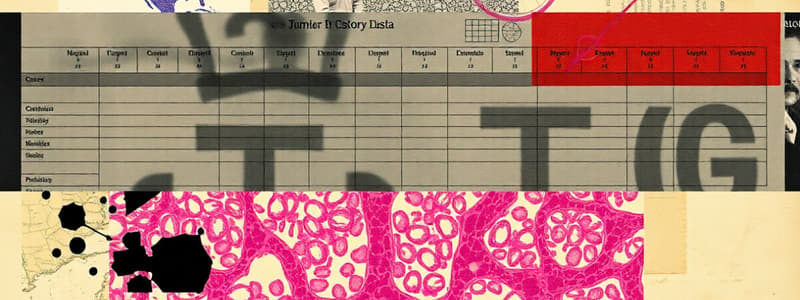Podcast
Questions and Answers
What distinguishes the Cancer PathCHART initiative from previous standard-setting efforts in cancer surveillance?
What distinguishes the Cancer PathCHART initiative from previous standard-setting efforts in cancer surveillance?
- It replaces the need for expert pathologists in the review process, using automated algorithms instead.
- It is the first database to consolidate tumor site, histology, and behavior coding standards from various standard setters. (correct)
- It focuses exclusively on improving the speed of cancer data collection, rather than data quality.
- It relies solely on clinical oncologists for defining tumor site and histology combinations.
How does the Cancer PathCHART initiative ensure the quality and validity of tumor site and histology combinations?
How does the Cancer PathCHART initiative ensure the quality and validity of tumor site and histology combinations?
- Through an in-depth review process involving expert pathologists and tumor registrars. (correct)
- By using a streamlined process that avoids extensive reviews to expedite updates.
- By prioritizing the inclusion of all possible combinations, regardless of biological plausibility, to ensure comprehensive data capture.
- By excluding international organizations from the review process to maintain regional consistency.
In what specific scenario should the Solid Tumor Rules take precedence over the CPC*Search Tool?
In what specific scenario should the Solid Tumor Rules take precedence over the CPC*Search Tool?
- When determining the biological validity of a site/histology combination.
- When the CPC*Search Tool provides conflicting information compared to local registry guidelines.
- When needing to identify synonyms for the NOS term. (correct)
- When the CPC*Search Tool indicates that a site/histology combination is highly unlikely.
How does the Cancer PathCHART initiative address the issue of histologies that are valid for specific sites within a site group but not for all sites in the group, as described in the WHO Classification of Tumors books?
How does the Cancer PathCHART initiative address the issue of histologies that are valid for specific sites within a site group but not for all sites in the group, as described in the WHO Classification of Tumors books?
What is the primary role of the CPC*Search Tool, according to the provided information?
What is the primary role of the CPC*Search Tool, according to the provided information?
Flashcards
Cancer PathCHART
Cancer PathCHART
A collaboration to improve cancer surveillance data quality by updating standards for tumor site, histology, and behavior code combinations.
CPC*Search Tool
CPC*Search Tool
A webtool on the Cancer PathCHART website for searching tumor topography, histology, and behavior codes and terms.
Purpose of CPC*Search Tool
Purpose of CPC*Search Tool
The CPC*Search Tool is an additional resource to determine if a site/histology combination is biologically valid, unlikely, or impossible. It does not replace the Solid Tumor Rules when determining histology coding.
Site-Specific Histologies
Site-Specific Histologies
Signup and view all the flashcards
NOS Terminology
NOS Terminology
Signup and view all the flashcards
Study Notes
- Cancer PathCHART is a collaboration among North American and global registrar, registry, pathology, and clinical organizations.
- The main goal is to improve cancer surveillance data quality by updating standards for tumor site, histology, and behavior code combinations and associated terminology.
- The initiative reviews histology and behavior codes (and associated terminology) by tumor site, includes expert pathologists and tumor registrars.
- The Cancer PathCHART database serves as the single source of truth standards for tumor site, histology, and behavior coding across all standard setters.
- A webtool is available on the Cancer PathCHART website that allows searches for tumor topography, histology, and behavior codes and terms.
- The search tool indicates if the tumor topography and histology combination are biologically valid, unlikely, or impossible
Cancer PathCHART Search Tool
- The CPC*Search Tool does not replace the Solid Tumor Rules when determining histology coding.
- The search tool is an additional resource primarily to determine if a site/histology combination is biologically valid, unlikely, or impossible.
- Many histology tables in the Solid Tumor Rules include more than one site or site group and are based on current WHO Classification of Tumors books.
- The CancerPathCHART review determined that some histologies are valid for specific sites and not for all sites within a site group.
- The valid C-code will be denoted in bold next to the histology or histologies in applicable tables, including combination/mixed histology code tables.
- Coding these histologies to a site other than the one(s) noted in the tables has been determined to be biologically impossible and will not pass edits.
- The Solid Tumor histology tables include synonyms for the NOS term, while the CPC*Search Tool is limited to the WHO preferred term
Studying That Suits You
Use AI to generate personalized quizzes and flashcards to suit your learning preferences.




